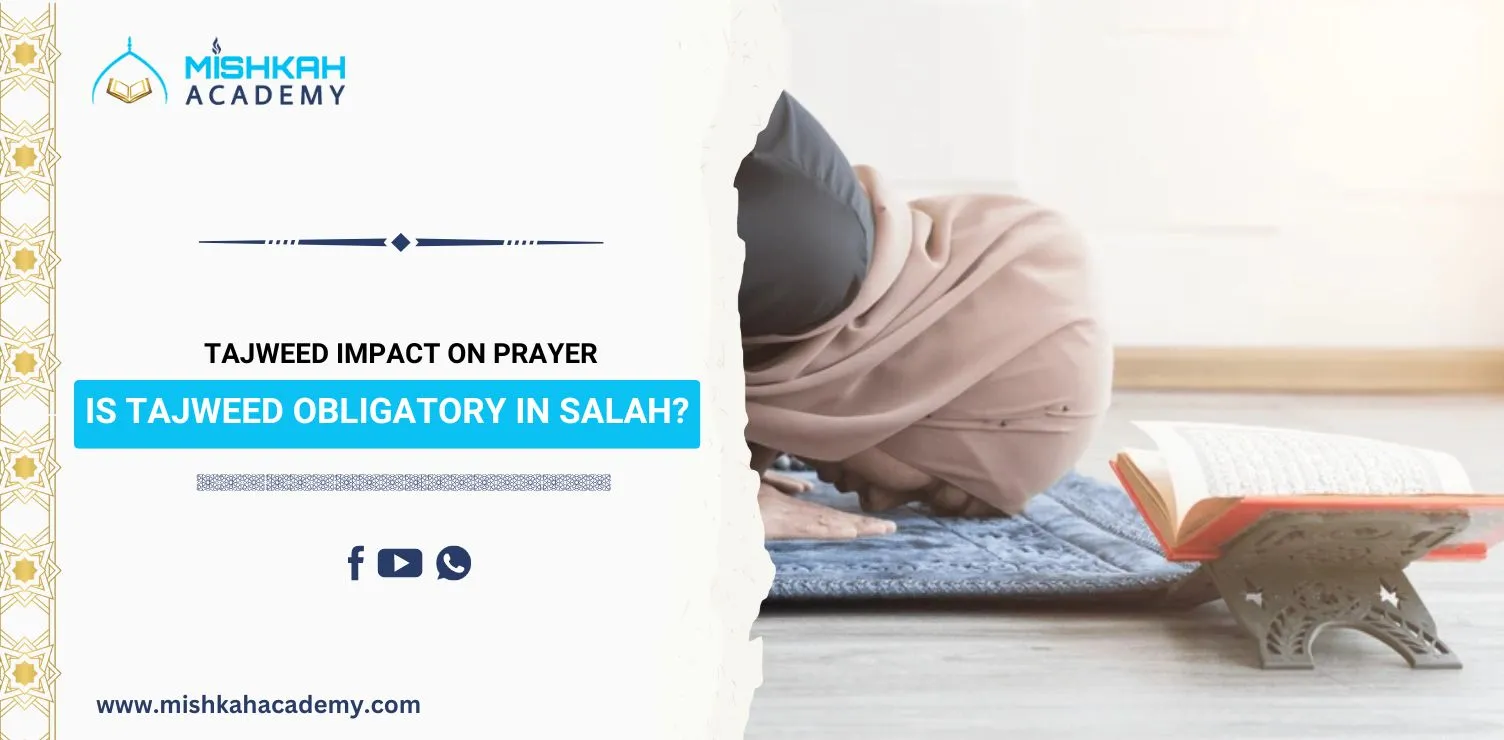Tajweed, the art of proper Quranic recitation, has been practiced since the time of the Prophet (SAW) to preserve the Quran’s original pronunciation. While it holds great historical importance, many Muslims today are unsure if Tajweed is strictly required in Salah. Though it’s not obligatory for every individual, understanding its role in prayer is essential to ensure accurate quran recitation.
This guide will explore key Quranic verses and Hadith that shed light on the significance of Tajweed in Salah, helping clarify its role and importance. Through this, Muslims can gain a better understanding of how to maintain the integrity of their prayers without feeling burdened by complex rules.
Let’s Define Tajweed First – What Is It?
Table of Contents
ToggleTajweed is the set of rules used to recite the Quran properly. It focuses on pronouncing each letter correctly, as the Prophet (SAW) did. Tajweed helps you say the words in the way they were revealed. This includes knowing where to pause and how to extend sounds. With Tajweed, the meaning of the verses stays clear and accurate.
It’s a practical guide to make sure every word of the Quran is recited with respect. Tajweed is important for keeping the message of the Quran unchanged across different readers and languages.
The Scholar’s Perspective on Tajweed in Salah
Scholars have different views on the importance of Tajweed in Salah.
- Ibn Al-Jazari’s view: Tajweed is Fard (obligatory) during Salah. He states that failing to use proper Tajweed can lead to altering the Quran’s meaning, making it sinful.
- Scholars of Qiraat and Tajweed: Tajweed is crucial to preserve the Quran’s message, and not applying it in Salah can be considered a mistake.
- Hanafi scholars’ perspective: Tajweed is Mustahab (recommended), not obligatory. As long as the recitation does not change the meaning, the Salah remains valid.
- General consensus: Most scholars agree on the importance of at least basic Tajweed to avoid errors that could alter the meaning of Quranic verses.
Another group thinks Tajweed is good but not essential. They say small mistakes don’t make the prayer invalid. They focus on the worshipper’s heart and devotion, not just Tajweed.
“The essence of Salah lies in the worshipper’s heart and intention, not solely in the perfection of Tajweed. As long as the recitation is understandable and the heart is present, the prayer remains valid.”
Note: In the Mishkah Academy Advance tajweed course students learn all about tajweed through the advance level to understand quran word by word and recite it properly.
Is Tajweed Obligatory in Salah?
Tajweed is not strictly obligatory in Salah according to the Quran and Hadith. However, it is essential to learn and understand Tajweed rules. This helps avoid mistakes in recitation and ensures the Quran is read correctly. Scholars have different views on this matter. Some argue that not following Tajweed can invalidate the prayer.
Others believe minor mistakes do not nullify it. Overall, while Tajweed is not a strict obligation, learning it is vital for meaningful and accurate recitation of the Quran during Salah.
Here is a summary of these views:
| Perspective | Tajweed in Salah |
| Obligatory (Fard) | Failure to adhere to Tajweed can invalidate the Salah. |
| Recommended (Sunnah) | Absence of Tajweed does not necessarily nullify the Salah. |
The debate on Tajweed’s role in Salah continues. Scholars have different views. It is essential to recite the Quran well and focus on the prayer’s true meaning and feeling.
What Does the Quran and Hadith Say About Tajweed?
Quranic Reference on Tajweed
The Quran commands us to recite its verses correctly. In Surah Al-Muzzammil (73:4), Allah instructs:
“…and recite the Quran with measured recitation.”
This verse highlights the importance of reciting the Quran carefully, using proper pronunciation. Scholars interpret this as the basis for Tajweed. It emphasizes the need to give each letter its due right, preserving the Quran’s meaning.
Without Tajweed, even a slight error could change the message of a verse. Thus, while learning Tajweed isn’t obligatory for everyone, understanding its rules helps Muslims maintain the Quran’s purity and sanctity during recitation.
Hadith Reference on Tajweed
In a famous Hadith, the Prophet (SAW) said,
“The one who is proficient in the recitation of the Qur’an will be with the honorable and obedient scribes (angels)...” (Al-Bukhari and Muslim).
This Hadith shows the value of reciting the Quran with skill, implying the importance of Tajweed.
Scholars argue that this Hadith highlights Tajweed’s role in perfecting one’s recitation. Those who recite with proper Tajweed are promised a special reward. Even for those who struggle, the Prophet assures double the reward. Thus, it is encouraged to strive for precision in recitation, guided by Tajweed rules.
Why Should You Learn Tajweed?
Learning Tajweed is essential for every Muslim to enhance their Salah and maintain the integrity of their recitation. Mistakes in Tajweed can have significant consequences during prayers. These mistakes often stem from mispronouncing letters or ignoring proper articulation rules, leading to distortions in the meaning of the Quran.
Here are some common mistakes and their implications:
- Improper Differentiation of Letters: Mixing up similar sounds, such as ق (qaf) and ك (kaf), can change the meaning. For example, the word كافر (kaafir) versus قافر (qaafir).
- Failure to Apply Ikhfa and Idgham: Not correctly applying these rules can disrupt the flow of recitation. For instance, من (min) followed by البقرة (al-Baqarah) should be pronounced with Ikhfa.
- Neglect of Makhaarij and Sifaat: Not focusing on the points of articulation can alter the sound of letters. For example, the difference between ط (ta) and ت (taa) can impact the meaning of phrases.
Consequences of Not Knowing Tajweed in Salah
The consequences of these mistakes include potential invalidation of Salah, a weakened spiritual connection, and displeasing Allah.
Understanding and mastering Tajweed ensures that recitation remains accurate, enhancing both the validity of Salah and the emotional connection with the Quran. Learning Tajweed deepens our bond with the sacred text, leading to a more fulfilling prayer experience.
Conclusion
Mastering Tajweed is vital for every Muslim to ensure the accuracy and spiritual richness of Salah. Proper recitation not only upholds the integrity of the Quran but also strengthens our connection to Allah.
For those seeking to learn Tajweed and its rules from the beginning, Mishkah Academy stands out as the best resource. With expert guidance and a comprehensive online tajweed course, Mishkah Academy equips students with the necessary skills to recite the Quran beautifully and correctly.






